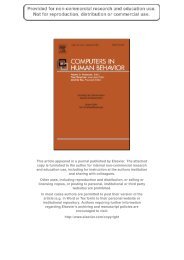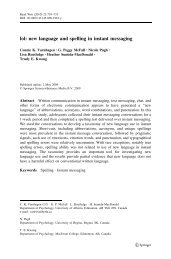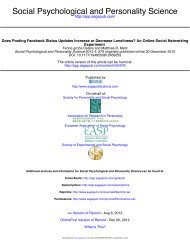Warschauer.pdf
Create successful ePaper yourself
Turn your PDF publications into a flip-book with our unique Google optimized e-Paper software.
48 Learn Inq (2007) 1:41–49<br />
instead new and old are woven together in a complex web reflecting evolving social,<br />
economic, and political relationships. New technologies do not replace the need for<br />
strong human mentorship, but, indeed, amplify the role of such mentorship. And the<br />
proliferation of new media, while opening up avenues for learning outside of schools,<br />
simultaneously strengthens the role of formal schooling in an increasingly competitive<br />
society and economy.<br />
Curricular and pedagogical approaches to educational technology exist that can<br />
foster improved digital learning for all. Such approaches emphasize scaffolding in<br />
reading, writing, and cultural literacy while providing access to new digital-era literacies;<br />
involve strong person guidance and mentorship from teachers and peers; and<br />
serve to make links between in-school and out-of-school learning, rather than<br />
devaluing either (see examples and discussion in Brown, Cummins, & Sayers, 2007;<br />
<strong>Warschauer</strong>, 2006; <strong>Warschauer</strong>, Grant, Del Real, & Rousseau, 2004). Such<br />
approaches will not magically overcome educational inequity; that is a broader<br />
challenge involving much more than good use of computers in schools. But simplistic<br />
views of digital learning, which pit new literacies against old, autonomy versus<br />
mentorship, or home versus school, will only serve to worsen educational divides.<br />
References<br />
Albright, J., Purohit, K. D., & Walsh, C. H. (in press). Hybridity, globalisation and literacy education<br />
in the context of NYC’s Chinatown. Pedagogies.<br />
American Library Association. (2000). Information literacy competency standards for higher education.<br />
Retrieved February 2, 2006, from http://www.ala.org/ala/acrl/acrlstandards/standards.<strong>pdf</strong>.<br />
Anderson, R. E., & Ronnkvist, A. (1999). The presence of computers in American schools. Teaching,<br />
Learning, and Computing: 1998 Survey Report. Irvine, CA: Center for Research on Information<br />
Technology and Organizations.<br />
Attewell, P., & Battle, J. (1999). Home computers and school performance. The Information Society,<br />
15(1), 1–10.<br />
Attewell, P., & Winston, H. (2003). Children of the digital divide. In P. Attewell, & N. M. Seel<br />
(Eds.), Disadvantaged teens and computer technologies (pp. 117–136). Münster, Germany:<br />
Waxmann.<br />
Becker, H. J. (2000). Who’s wired and who’s not? The Future of Children, 10(2), 44–75.<br />
Bolter, J. D. (1991). Writing space: The computer, hypertext, and the history of writing. Hillsdale, NJ:<br />
Lawrence Erlbaum Associates.<br />
Brown, K. R., Cummins, J., & Sayers, D. (2007). Literacy, technology, and diversity: Teaching for<br />
success in changing times. Boston: Allyn & Bacon.<br />
Bureau of Labor Statistics. (2005). Tomorrow’s jobs. Retrieved February 2, 2006, from http://<br />
www.bls.gov/oco/oco2003.htm.<br />
Castells, M. (1996). The rise of the network society. Malden, MA: Blackwell.<br />
Cummins, J. (2001). Negotiating identities: Education for empowerment in a diverse society.<br />
Los Angeles: California Association for Bilingual Education.<br />
Daley, E. (2003). Expanding the concept of literacy. EDUCAUSE Review, 38(2), 32–40.<br />
Day, J. C., & Newburger, E. C. (2002). The big payoff: Educational attainment and synthetic estimates<br />
of work-line earnings. Washington, DC: Commerce Department, Economics and Statistics<br />
Adminisration, Census Bureau.<br />
Eisenstein, E. L. (1979). The printing press as an agent of change: Communications and cultural<br />
transformations in early-modern Europe. Cambridge: Cambridge University Press.<br />
Feenberg, A. (1991). Critical theory of technology. New York: Oxford University Press.<br />
Feldman, A., Konold, C., & Coulter, B. (2000). Network science, a decade later: The Internet and<br />
classroom learning. Malwah, New Jersey: Lawrence Erlbaum Associates.<br />
Feldon, D. (2004). Dispelling a few myths about learning. UrbanEd, Fall/Winter, 1(4), 37–39.<br />
123
















